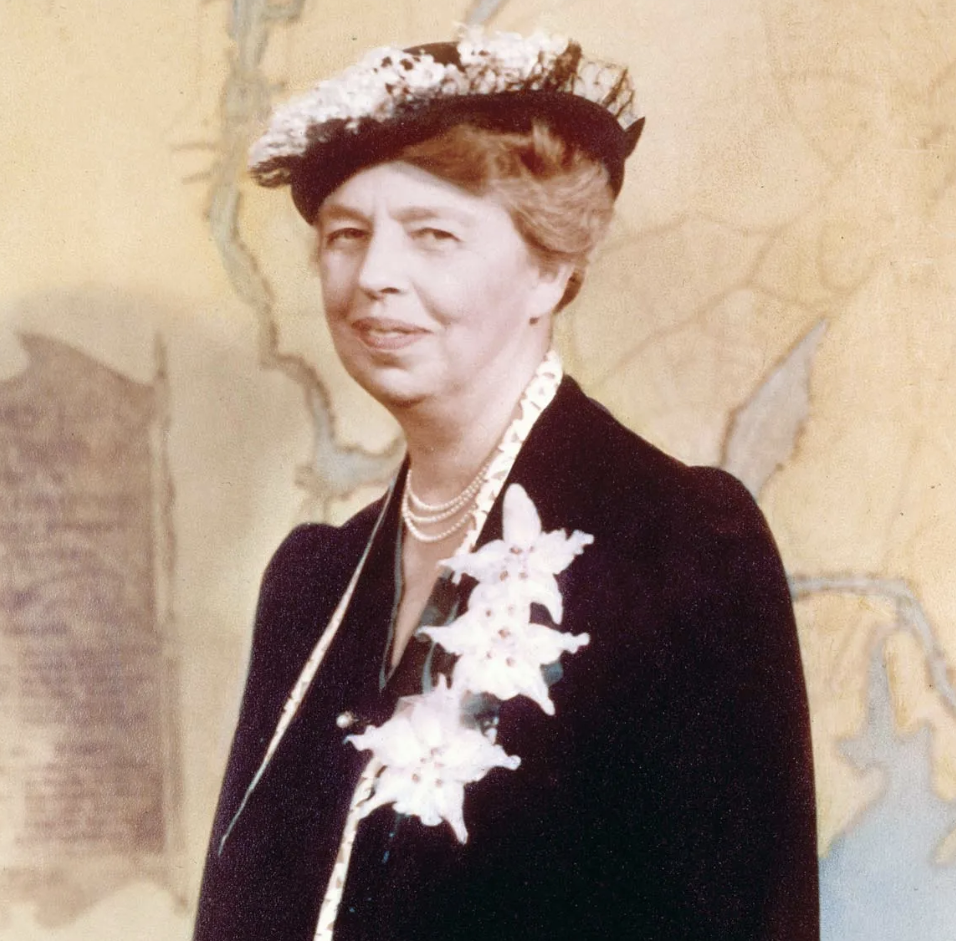Eleanor: The Most Powerful of the Roosevelts

Courtesy of the Franklin D. Roosevelt Library and Museum website; version date 2009
In a political and diplomatic sphere predominated by men, including men of her own family, Eleanor Roosevelt proved to be more extraordinary than many of them — even putting one on the map while she was at it. She was one of the most influential women figures of the twentieth century who steered the path for women in the future. She was the perfect example of a woman embracing her tragic experiences to understand and improve the lives of those around her.
Her tumultuous childhood inspired her future humanitarian and political endeavors. She was born in New York City on October 11, 1884, to an affluent but charitable family; her father was Elliot Roosevelt, the younger brother of President Theodore Roosevelt. She lost her mother and younger brother to diphtheria and her father to alcoholism before she turned ten years old. Orphaned at a young age, she was raised by a strict grandmother who enforced her education through private tutors. At the age of fifteen, she was sent to Allenswood, a girls’ boarding school in England, where the school’s French headmistress, Marie Souvestre, recognized Roosevelt’s potential. According to Betty Boyd Caroli, Souvestre’s “intellectual curiosity” and “taste for travel and excellence” attracted Roosevelt and reflected the knowledge and revolutionary thought she gained during her time there. She learned to speak French fluently, played varsity field hockey, and developed a radical perspective on women’s identities and social responsibilities. Roosevelt’s return to New York three years later led to her social debut, which included a teaching position at the Rivington Street Settlement House in the Lower East Side, as well as a courtship and marriage to her distant cousin and future President of the United States, Franklin Delano Roosevelt.
Eleanor’s new life, however, did not provide her with the harmony and stability she wished for in marriage. Sara Roosevelt, her mother-in-law, exerted control over the newlyweds and their household, widening the already present rift between them. Eleanor considered her marital duty an ordeal and sought fulfillment elsewhere, specifically in social reform and humanitarian work. She was raised on the principle of charity, and her education at Allenswood further invigorated her early involvement in political work. The discovery of her husband’s infidelity in a series of letters he exchanged in 1918 with Lucy Mercer, her social secretary, only reinforced Eleanor’s decision to pursue political and social work. As divorce was forbidden, Eleanor chose to remain married to FDR in name only. It ceased to be an intimate marriage, but she continued to support him in his political endeavors—even more so after he was stricken with polio and left permanently paralyzed. She became more involved in political campaigns and stood in for her husband in moments when he was unable to.
Even before she became First Lady in 1933, Eleanor Roosevelt directed her all energy and passion towards political affairs. She was a proponent for women’s rights, playing important roles in entities like the League of Women Voters, the Women’s Trade Union League, and the Women’s Division of the Democratic Party. After her husband was inaugurated as President, she encouraged him to appoint women to his cabinet. She was also instrumental in preserving civil rights; she advocated for the New Deal and ensured it remained in place even when the United States entered the Second World War, and she supported the anti-lynching bill in the hopes of attaining peace between White and Black communities in the States. She was the driving force behind her husband’s presidential rule.
She also used her position to strongly advocate for humanitarian aid. She aided in relief missions that sought to improve living and working conditions for residents in tenement communities. The charitable trait her grandmother instilled in her upbringing prevailed in her political and humanitarian projects for the rest of her life. Anya Luscombe and Dario Fazzi report that Roosevelt’s desire for social justice resulted in a steadfast commitment to improving the lives of the people, particularly those of young girls and families living in much less fortunate circumstances. Her roles at the Todhunter’s School for Girls and in organizations centered on child welfare and housing reform fueled the people’s admiration for her. Her philanthropy became a powerful political force that influenced the American political spheres during and after FDR’s presidential terms. His death in 1945 did not deter her from partaking in political and diplomatic undertakings. She became a delegate to the United Nations. She was also the first Chairman of the Human Rights Commission in 1946 for six years, serving as an influential figure in the drafting and ratification of the Universal Declaration of Human Rights.
Highly intelligent, she employed technology to publicize her knowledge and uphold future domestic and international peace. Her use of the radio as an instrument of soft power was effective in communicating with American and foreign citizens alike, propagating American policies intended to convey the interests of the American nation and its diplomatic allies. Her fluency in the French language, which she acquired during her time at Allenswood, allowed her to connect more directly with French citizens in particular, strengthening long-term diplomatic relations between France and the United States.
She also knew how to negotiate, garnering the attention of foreign diplomats, particularly those in the former Yugoslavia, the Middle East, and South Asia. In 1952, former U.S. Secretary of State, Dean Acheson, boasted of her effectiveness as a diplomat to President Harry S. Truman, writing of her ability to gain the support and admiration of the public everywhere. She engaged in as much political work as possible before she passed away in 1962, leaving an impact everywhere.
Her desire to achieve peace and advocate for human and civil rights was admired throughout the world. Her diplomatic accomplishments have influenced public diplomacy and humanitarian work and left an impression on those following in her footsteps to this day. In a political and diplomatic sphere predominated by men, including men of her own family, Eleanor Roosevelt proved to be one of the most influential American politicians of the twentieth century.
Editor
Corinne Lattermann, Editor in Chief

Sara Radovic (she/her) is a second-year MA candidate in International Relations at NYU. She obtained her bachelor’s degree in English with a minor in art history from Rutgers University in 2022, where she also wrote for the Rutgers Undergraduate Law Review (RULR). Some of her articles for RULR include Importance of National Paid Maternity Leave, The Controversial Conversion of Hagia Sophia and Law Involvement in Enhancing Education for Students with Dyslexia. She currently helps clients file claims with the September 11th Victim Compensation Fund. Her primary interests include international law, human rights law, and selective commemoration of victims, particularly in the Balkans. When not studying or working, you can find her enjoying an iced vanilla oat latte at Ralph’s Coffee or exploring art museums in New York City.




